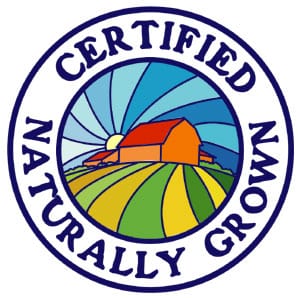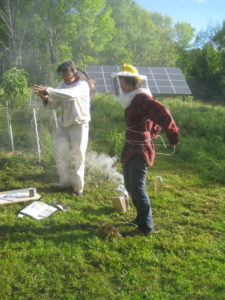Is Your Honey Green? New Apiary Certification Program for Natural Beekeepers
by Dr. Buddy Marterre and Alice Varon
We all know honey bee health is threatened by pesticides, monoculture crops, in-hive chemical treatments, pests and diseases, and colony collapse disorder, among other things. One result has been a rise in natural beekeeping, regarded by many as the surest way to support the health of honey bees.
Beekeepers may wonder, is there a way to convey the value of your natural methods and gain a premium for your honey? Is organic certification an option? Until recently, the answer to these questions was “no” for most beekeepers.
We, the authors of this paper (Buddy and Alice), were very frustrated by this situation. A few years ago we joined forces — and with the help of expert beekeepers from across the country — drafted standards for ‘Certified Naturally Grown’s’ apiary certification program.
The primary purpose of CNG’s apiary program is to encourage beekeeping practices that will support the health and welfare of honey bees in America. The program does this by: 1) providing detailed guidance on best practices; 2) strengthening the natural beekeeping community through local networks of mutually-supportive natural beekeepers; and 3) creating a financial incentive for natural beekeeping through certification.
Some participating beekeepers don’t need the financial incentive and are just looking to be part of a local community of beekeepers. For those who do have a financial incentive, apiary certification has a lot to offer. It helps market your natural honey by offering promotional materials, attractive sticker-labels, a profile of your apiary on the CNG website, and the prestige of affiliating with a well-respected national program.
The CNG apiary standards offer guidance on how to manage your colonies without exposure to synthetic chemical treatments. They not only define what is required and prohibited to remain certified, but also give recommendations on best practices. They are strict but doable. A comprehensive list of allowed and prohibited substances is included in the certification guidelines, available on the website and also published as a booklet: Handbook for Natural Beekeeping, available at www.naturallygrown.org/store.
For those moving away from synthetic treatments, a transition table lays out the time frame and steps needed to achieve full certification. CNG’s apiary certification is tailored for beekeepers with between 3 and 300 hives – ideal for hobbyists and sideliners.
Details on how to get certified are on the CNG website www.naturallygrown.org. In keeping with CNG’s grassroots model, you’ll find a little twist: before applying, you’ll need to identify at least two other members of your “local network.” These could be from a formal network like a county beekeepers association or from an informal network of natural beekeepers in your area.
Completing the application should take 15-30 minutes. You’ll be contacted by CNG within one to three weeks of submitting your application. If it is accepted, the following steps will complete your certification:
- Sign and return a one-page declaration. This indicates you understand the standards and won’t market as CNG any non-certified hive products.
- Send a financial contribution. CNG recommends contributions of $75 – $200 but it’s up to each member to determine the exact amount.
- Arrange your apiary inspections. Two inspections per season are required and should be carried out by beekeepers that you know.
- Inspect another CNG apiary (if there is one in your area). This is the work requirement, and it can be a great benefit, as it provides an on-site opportunity for learning.
Once you are fully certified, you will receive a certificate in the mail. You may use the Certified Naturally Grown name and logo, and purchase labels and other promotional materials. You’ll have an apiary profile on the CNG website, which you can customize with descriptive text and photos.
But it might be that the great value of the CNG apiary program, and the reason many beekeepers have chosen to participate, lies in the learning opportunities and sense of camaraderie that it fosters and strengthens among natural beekeepers. In the face of daunting environmental challenges, it can be inspiring to join with others who choose to use natural methods to heal and strengthen the honey bee population.
More information on the Certified Naturally Grown program.
Dr. Buddy Marterre is an Eastern Apicultural Society (EAS) Master Beekeeper, North Carolina State Beekeepers Association Master Beekeeper, Past Vice President and current Membership Secretary NCSBA. He has taught bee school to over 450 students since 2004.
Alice Varon is Executive Director of Certified Naturally Grown. She started keeping bees in 2010 and is a member of the Ulster County Beekeepers Association.




I’m interested. We’ll be selling our first honey harvest this Fall.
We have had hives for 3 years. We never use, nor have any need for, any chemicals, poisons or genetically altered plant material. We have our own proprietary system of bee and bee hive management.
Hi
I am from Saudi Arabia and I am looking to gain more knowledge and experience on honey.
How I can a proceed to get a certification on this
Natural beekeeping is a growing trend here in Australia too. I hope there is a similar movement to move away from Synthetic in the near future.